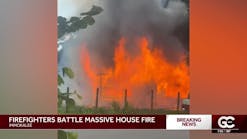SACRAMENTO, Calif. (AP) -- The cost of fighting California's wildfires is spiraling upward, quickly topping a $1 million a day, in part because of overtime paid to firefighters, according to a report by the state's legislative analyst.
The report released Tuesday recommends lawmakers consider renegotiating a contract with firefighters and review whether it would be cheaper to hire more firefighters instead of relying on overtime. It also suggested lawmakers consider adopting a fire-protection fee on property owners that was repealed before it took effect this year.
The state's annual firefighting costs have varied between $400 million and $500 million for five years, but spiked to $612 million last fiscal year after devastating wildfires scorched Southern California. Spending has risen about 10 percent each year because of increasing labor costs and residential movement into uninhabited wildlands.
Labor costs account for roughly half the state's firefighting expenses. Much of the spending growth can be traced to overtime pay and an overtime pay increase that takes effect this year, the nonpartisan office found.
Firefighters now work three 24-hour shifts each week, or 72 hours, during fire season. But under federal law, overtime begins after 53 hours, so they routinely are paid 19 hours of overtime.
Those costs will jump again in July 2006, when firefighters begin working 24-hour shifts all year instead of just during fire season.
Gov. Arnold Schwarzenegger's administration tried to renegotiate the contract a year ago without success, because there was no incentive for the union to give up any benefits, the report noted.
Key legislators and their consultants declined to comment on the report Tuesday, saying they had not reviewed its findings.
Jim Wright, chief of fire protection for the California Department of Forestry and Fire Protection, said no renegotiation efforts are planned, though the department is considering hiring more firefighters.
Terry McHale, who handles public policy for the union representing forest firefighters, said the contract means union members work a third more hours than municipal firefighters because they work more frequent 24-hour shifts.
''It's a great deal for the state,'' even at the higher contract cost, McHale said.
Local governments that contract with the state for fire protection will pay more, too, because they must reimburse state agencies for their help.
The department now employs about 2,000 year-round firefighters and another 740 seasonal firefighters, plus 1,700 state employees paid for by local governments. That does not include 198 inmate fire crews scattered at camps around the state.
On the Net:
The report is at: www.lao.ca.gov






